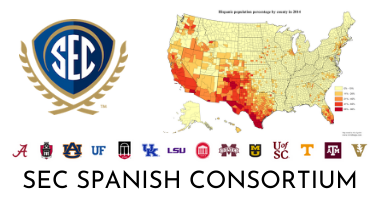
Research Collaborations
We seek to bring together SEC Scholars working on issues related to Spanish in our region from interdisciplinary perspectives, including:
- Academic enrollment and the increasing number of Latinos in Sec Schools
- Migration and population studies
- Education and teaching of Spanish as a Heritage and as a Second Language
- Linguistic issues, language contact and bilingualism
- Identity and cultural aspects of the Spanish-speaking cohorts of speakers
- Socio-historical information
-

International Memphis: Migration and Urban Transformation
Simone Delerme
This research documents the history and transformation of Summer Avenue—a commercial district in Memphis, Tennessee — due to changing residential patterns and the influx of migrants and their families. Memphis is a city with a history of segregation and a historic black-white racial binary; however, migrants are challenging the binary as they settle in Memphis and transform residential and commercial spaces. In 2019, the Summer Avenue Merchant’s Association (SAMA) began an effort to brand Summer Avenue as Memphis’ first official international district in an attempt to embrace the area’s cultural diversity, particularly the restaurants that are owned by individuals that migrated from different parts of the world.
This project focuses on the experiences of business owners that contributed to the international place-identity of the avenue and the revitalization of the community. Through participant observation, oral history interviews, archival research, and analysis of new media, this research examines how migrants are incorporated into the social, political, and economic life of communities that were non-traditional destinations of migration. The growing number of immigrant-owned businesses in Memphis represents gradual incorporation into the local economic market. These businesses are the visual markers in the landscape that signal the internationalization of Summer Avenue. In Memphis, newspapers, radio stations, magazines, festivals, folkloric groups, non-profit organizations, churches, and other institutions have also been created to provide services to the immigrant community, preserve and celebrate diverse cultures, and incorporate the incoming population of migrants into the region. Still, there are challenges to incorporation that continue in the current anti-immigrant political climate.
This research highlights the economic impact that immigrants have on receiving communities, but also reveals the obstacles that entrepreneurs face when trying to start and formalize their businesses. Access to information and linguistic barriers, for example, have hindered the advancement of some business owners, but formal and informal strategies have enabled others to remain viable.
Related Resources:
“Reflections from the Field: Discovering International Memphis” https://southernstudies.olemiss.edu/reflections-from-the-field-discovering-international-memphis/
Latino Memphis and Oxford https://www.southernfoodways.org/oral-history/latino-memphis-and-oxford/
El Sur Latino https://www.digital-ethnography.org/el-sur-latino
-

Two Case Studies of Language Ideology and Practice in the U.S. South: Spanish in Northern Mississippi and Eastern North Carolina
Stephen Fafulas and Matthew J. Van Hoose
This year we have made some modest but exciting gains in our understanding of Spanish-speaking populations in the U.S. South. Drawing on a corpus of more than 60 participants which includes first- and second-generation Spanish speakers in Northern Mississippi and eastern North Carolina, we are working to identify the most salient comparisons and contrasts between these Southern variants of Spanish and those of larger and more well-established population centers that have received more attention to date in the literature. In this way, our study will expand and complexify understandings of the linguistic, social, and cultural dimensions of the U.S. Spanish macro-dialect. Our analysis of migration patterns, language ideologies, and linguistic features of Spanish speakers in Mississippi and North Carolina also provides a laboratory of language variation and change in real time for scholars working on issues of bilingualism, education, and anthropology (to name a few) in the U.S. South.
-

Incipient Language Shift in a Southern Latino Community
Chad Howe
This project was developed in collaboration with the Roswell Voices project, which began in 2002 as a partnership between researchers at the University of Georgia (Professors William A. Kretzschmar, Jr. and Sonja Lanehart) and the Roswell Folk and Heritage Bureau, to document language and life in the community. Preliminary work indicates extended contact-induced language shift, observed in both the English and Spanish of bilingual communities (Limerick 2017, Howe and Limerick 2020). We have argued that the Mid-Atlantic US in general and Roswell, GA in particular represent an ideal test case for studying emergent speech communities in that it displays several of the benchmarks of demographic change characteristic of American urbanization during the end of the twentieth century. The combination of demographic and linguistic factors exhibited in Roswell offers a compelling new case study in our attempt to answer questions about the emergence of language patterns in the presence of relative social, ethnic, and linguistic heterogeneity. In the proposed study, we assume the perspective of individual speakers as loci for the adaptation and innovation of social practices, in this case manifested by language variables. The aggregate affect of individual speaker behavior is then proposed as a way of representing the language of a speech community. By observing the linguistic behavior of Spanish speaking residents in Roswell, this study takes advantage of a timely opportunity to observe patterns of language use as a function of the social practices of disparate communities of language users.
-

Researching, Teaching, and Learning Spanish as a Heritage Language
Diego Pascual y Cabo
As Director of the Spanish Heritage Language Program at the University of Florida, this area of research has practical implications on preparing students,, teachers and researchers in the area of Spanish as a heritage language and bilingualism more generally. The newly-launched Spanish Heritage Language Journal was created specifically with this purpose in mind. SHL is co-published by the University of Florida Press and the Department of Spanish and Portuguese Studies at the University of Florida.

